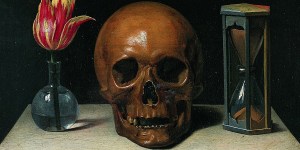The very name of Golgotha is creepy. In Aramaic, it means “skull,” or the place of the skull. It was a skull-shaped hill just outside the walls of Jerusalem. Even its Latin name, Calvary, means “skull.” It was, it seems, an obvious place for criminals to be put to death. And it was, of course, the place where Christ was put to death. The place where the criminals executed the innocent man.
Traditionally, the image of the skull has been the emblem of the memento mori, the reminder of death. It is seen in Christian art and is found as an allegorical figure in Christian literature. For Christians, the skull, as a memento mori, is meant to remind us of the Four Last Things: Death, Judgment, Hell, and Heaven. It is appropriate, therefore, that we should keep our eyes on Golgotha.
But we should do more than keep our eyes on Golgotha. We should see ourselves on the skull-shaped hill itself. We were there when they nailed Christ to the cross. All of us were there. As He was nailed to the cross, it was our sins that hammered the nails into His flesh. This was why Mel Gibson chose to hold the nail that was hammered into Christ’s hand in the film he produced, The Passion of the Christ. It was an act of penance.
There is, however, another way that we are on Golgotha during the season of Lent and during all the seasons of the year. We are there as fellow sufferers with Christ, not as innocent victims but as culprits. We are not merely those who crucify Christ. We are also those who are crucified. All of us suffer. Suffering is unavoidable. We suffer for our own sins and we suffer from the sins of others. We all have our own crosses to carry and we are all sometimes nailed to them.
The question is not whether we will suffer. Of course we will. The question is what we will do with the suffering when it comes. Will we be like the bad and impenitent thief, who is crucified on Christ’s left? Will we blame everyone else for our sins except ourselves? Will we blame our neighbours or our enemies? Will we blame God?
Or will we be like the good and penitent thief, who is crucified on Christ’s right? Will we acknowledge our own sinfulness? Will we acknowledge that our sins have hurt our neighbors and our enemies? Will we blame ourselves and ask God to forgive us our trespasses and deliver us from evil?
When we spend time in the place of the skull, reminding ourselves of the death that awaits us, how will we judge ourselves? Will we judge ourselves self-righteously, condemning ourselves to the hell we have made for ourselves? Or will we judge ourselves as needing merciful forgiveness, gaining from Christ the place with Him in paradise that he promised to the good thief?


